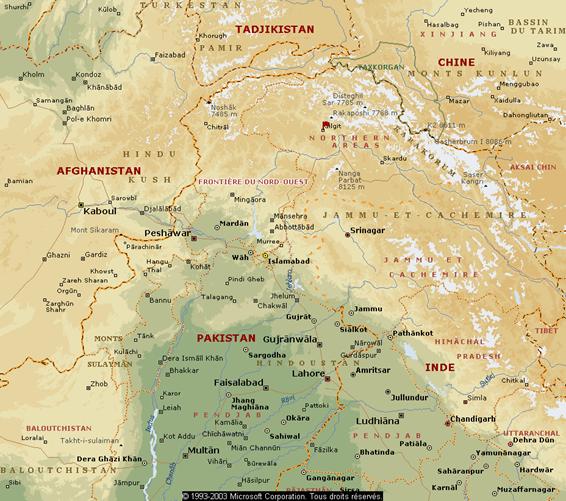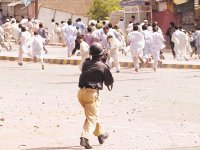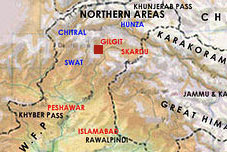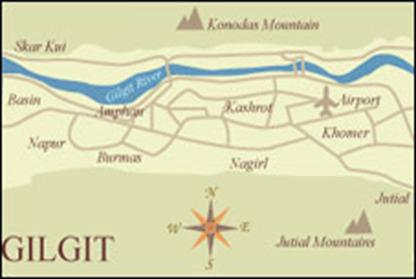

Pas
d’URL
One Killed as Shiite Protesters and Army Clash in
Investigators Name an
Al Qaeda-Linked Militant Group Chief Suspect in Shiite Mosque Bombing
By
Shabbir Ahmed Mir
The Associated Press
Thursday, June 3, 2004; 9:57 AM
GILGIT,
Dozens of minority Shiites ransacked a state-run radio station and
attacked other government offices in the northern city of
Authorities had imposed a round-the-clock curfew to prevent the protest,
fearing that tensions from Shiite-Sunni violence in the southern port city of
The protesters, defying the order, pelted security forces with stones and
opened fire, wounding two paramilitary soldiers and two policemen, a government
official said on condition of anonymity.
Security forces returned fire, killing a youth and wounding two other
protesters.
Police arrested eight people, including Shiite leader Agha Ziaudin.
Violence in
The attacks brought mobs of Shiite and Sunni youths to the streets, and
some officials suspect the attacks were aimed at igniting sectarian unrest.
Senior police investigator Gul Hameed Sammu said the suicide bombing was
similar to an attack May 7 at a Shiite mosque in
Police suspect that Lashkar-e-Jhangvi, a radical Sunni extremist group
with members linked to al Qaeda and the murder of American journalist Daniel
Pearl, was behind both bombings, he said.
http://www.dailytimes.com.pk/default.asp?page=story_5-6-2004_pg3_1
Daily
Times, 04-06-04
EDITORIAL: The plight of the Northern Areas
The syllabus issue in Gilgit continues to hang fire. On
June 3, the local administration imposed curfew in the city after clashes broke
out between the police and the Shia mobs protesting the new syllabus. Earlier, a
meeting between the leaders of the community and the administration had failed
to break the impasse on the issue. What’s going on?
Sporadic news has been coming out of Gilgit about the syllabus problem for the
past one year. We know that the Shias there are unhappy over certain passages
and pictures in the officially prescribed Islamiyat textbook. But it is a
measure of the failure of the mainstream press that most newspapers have not
bothered to dig up the facts. Every story talks about the unrest and refers to
the syllabus but no attempt has been made to provide details of what exactly is
wrong with the textbook.
This is in line with the treatment we have meted out to the Northern Areas over
the past four decades. The only authentic account of the area’s plight is
recorded in ‘The Story of Gilgit, Batltistan and Chitral: A Short History of
Two Millenniums,’ a book by Faqir Mohammad Khan who somehow found access to
the archival material and put the pieces together. A similar account was
published sometime ago by a former Commissioner of the area in a newspaper op-ed.
Islam came to the region in the 13th century from Wakhan and it was Ismaili
Islam. Later, through the centuries, other sects have competed with the Ismailis
and we now have Sunnis as well as Twelver Shias in the area. According to FM
Khan’s book, today, Gilgit is 60 percent Shia, 40 percent Sunni; Hunza is 100
percent Ismaili; Nagar is 100 percent Shia; Punial is 100 percent Ismaili; Yasin
is 100 percent Ismaili; Ishkoman is 100 percent Ismaili; Gup is 100 percent
Ismaili; Chilas is 100 percent Sunni; Darel/Tangir is 100 percent Sunni; Astor
is 90 percent Sunni, 10 percent Shia; Baltistan is 96 percent Shia; 2 percent
Nurbakhti and 2 percent Sunni.
In the 1980s, the Pakistani state under Gen Zia-ul Haq made a deliberate attempt
to infuse Sunni-Deobandi cadres of a sectarian party in order to put down the
Shia. The problem of syllabus we now encounter in Gligit and also elsewhere is
the product of the state’s enterprise of backing a particular brand of Islamic
exegesis. Of course, there are other factors, not least the rampant corruption
in the region by officials of the state and lack of development and employment
opportunities. But the ground reality is that the area is sitting atop a time
bomb and the syllabus is the trigger that could activate it. That is why it is
surprising that despite the issue festering for so long the federal government
has done nothing visible to address it. Now it threatens to become a law and
order problem. *
EDITORIAL #2:
We beg to differ. The
Surely, no right-thinking person would want a similar fate for
The present Iraqi set-up is far from being ideal; it can’t be, given the
situation. But it is a beginning and we hope that President Ghazi Yawar (a Sunni)
and Prime Minister Ayad Allawi (a Shia) can steer
http://www.libertaddigital.com/noticias/noticia_1276224447.html
Viernes 4 de Junio de 2004
DEBIDO A LAS VIOLENTAS PROTESTAS CHIÍES
Pakistán
impone el toque de queda indefinido en una parte de Cachemira
El Ejército de Pakistán ha impuesto un toque de queda
indefinido en la ciudad cachemir de Gilgit y otras zonas del norte del país,
tras las protestas de la comunidad musulmana chií ante los cambios realizados
en textos de educación religiosa. Los manifestantes han cortado la carretera
que une el país con China a través de la cordillera del Karakorum, en el
Himalaya.
LD (EFE) Las autoridades han asegurado este jueves que se trata de evitar la
violencia entre las comunidades musulmanas, después de que representantes
chiítas manifestaran su desacuerdo con los nuevos textos, que en su opinión
dan una versión exclusiva del Islam suní, al que pertenecen la mayoría de los
paquistaníes. Los chiítas son 20 por ciento de los 145 millones de habitantes
de Pakistán, aunque en algunos lugares, como la ciudad de Qüeta en el oeste y
Cachemira, en el norte, esta comunidad es muy numerosa.
Vehículos
militares recorren las calles de Gilgit y otras poblaciones del norte, donde la
comunidad chiíta es muy importante, para evitar concentraciones y altercados,
tras haber detenido a varios líderes religiosos de esta confesión musulmana.
Los chiítas de la parte de Cachemira bajo control paquistaní tenían previsto
manifestarse contra los cambios educativos, pero las autoridades prohibieron
todas las concentraciones tras los últimos atentados de Karachi, que costaron
la vida el domingo a un destacado clérigo suní y el lunes a 20 fieles
chiítas.
Fuentes
locales dijeron a EFE por teléfono desde Gilgit que grupos de
manifestantes han cortado la carretera que une Pakistán con China a
través de la cordillera del Karakorum, en el Himalaya, y que los militares
tratan de volver a abrir la ruta.
http://www.prensa.com/hoy/mundo/1715788.html
LASERFOTO AP /Shakil Adil

Un policía
paquistaní dispersa a una enfurecida multitud que protestaba por un atentado
contra una mezquita ocurrido el pasado fin de semana y que desató
enfrentamientos religiosos entre musulmanes chiitas y sunitas en varios puntos
del país.
Panamá,
5 de junio de 2004
ISLAMABAD,
Paquistán (EFE).-Una persona murió en los enfrentamientos registrados entre
manifestantes musulmanes chiíes y las fuerzas de seguridad en la ciudad de
Gilgit, en la zona de Cachemira bajo control de Paquistán, informó ayer,
viernes,
Grupos
de manifestantes chiíes atacaron el jueves un centro de entrenamiento de
El
Ejército paquistaní mantiene el toque de queda indefinido impuesto desde la
noche del miércoles en Gilgit y otras poblaciones de la región himaláyica de
Cachemira, donde los chiíes protestan por una serie de cambios en los libros de
formación religiosa, que consideran que sólo se atienen a la doctrina
musulmana suní.
Decenas
de personas, entre ellas, ocho líderes chiíes, han sido detenidas por violar
el toque de queda.
Las
autoridades aseguraron que se trata de evitar la violencia entre las comunidades
musulmanas, después de que representantes chiíes manifestaran su desacuerdo
con los nuevos textos.
Los
chiíes son el 20% de los 145 millones de habitantes de Paquistán, aunque en
algunos lugares, como la ciudad de Qüeta, en el oeste, y en Cachemira, en el
norte, esta comunidad es muy numerosa.
Precisamente
tenían previsto manifestarse ayer en Cachemira contra los cambios educativos,
pero las autoridades prohibieron todas las concentraciones tras los últimos
atentados de Karachi, que costaron la vida el domingo a un destacado clérigo
suní y el lunes a 20 fieles chiíes.
Fuentes
locales dijeron a EFE por teléfono desde Gilgit que grupos de manifestantes
mantenían cortada ayer la carretera que une Paquistán con China a través de
la cordillera del Karakorum, en el Himalaya, mientras los militares trataban de
abrir la ruta.
http://www.dailytimes.com.pk/default.asp?page=story_5-6-2004_pg7_10
Daily Times, 04-06-04
34 held as Gilgit operation continues
By
Ibrahim Shahid
GILGIT: The Northern Areas (NA) administration would
continue its operation until miscreants were flushed out of their dens,
Inspector General of Police (IGP) for the NA Sakhiullah Tareen told journalists
on Friday.
“We
began an operation on Friday morning in Domiyal and arrested at least 34
miscreants involved in torching the Northern Areas Legislative Council Hall,
damaging Gilgit Circuit House and burnig two Northern Areas Transport
Corporation vehicles besides blocking
He
said talks on the syllabi issue were progressing in a positive direction. He
said that according to a formula, the Shia syllabi would be taught in Shia areas
and students in Sunni areas would be taught their syllabi. Mr Tareen said curfew
might be relaxed today (Saturday).
Agencies
add: A man was injured when Shias clashed with security forces for the second
day on Friday in Gilgit, officials said.
“A
man named Bilal Hussain was brought to hospital with bullet in his thigh,” a
doctor at the government hospital said.
“Fresh
reinforcements of army troops and paramilitary force have arrived in a special
aircraft,” Northern Areas police chief told reporters. Around 50 tourists
including four German diplomats have been stranded in Gilgit due to curfew.
Efforts for their safe return to
On
the other hand around 500 passengers, who were to reach Gilgit from
http://www.hipakistan.com/en/detail.php?newsId=en67017&F_catID=&f_type=source
Hi
GILGIT:
District Magistrate has issued the following press note on the situation in
Gilgit on Friday.
"Curfew that was clamped yesterday in the
Municipal limits of Gilgit continued today.
Groups of youngsters, emerging out of the nearby
narrow streets, again tried to further damage the VIP Rest House, Chinnar Bagh
this morning. The law enforcing agencies arrested thirty three trouble makers
who were mostly youngsters. In an incident of cross firing at Danyore bridge
between the protesters and law enforcing agencies one person received injuries
and was brought to DHQ hospital for treatment. The number of protesters gathered
across the Danyore bridge since lst evening is decreasing gradually as they are
going back to their respective nearby villages. Efforts are afoot to disperse
them peacefully and side by side negotiations with the community elders are also
going on. The KKH at Sakwar blocked yesterday has been cleared and the highway
is now open for vehicular traffic between
Operation clean up jointly by the Army and Police
is going on at Khomar, Nagral and Domial of Gilgit town. The administration is
taking all possible measures to bring the life of the city to normal and save
the lives and properties of the general public."
http://www.dailytimes.com.pk/default.asp?page=story_6-6-2004_pg7_5
Daily
Times, 04-06-05
Woman
injured, 80 arrested in Gilgit
*
Curfew continues
* Draft on curriculum revision sent to Shia leader for approval
Staff
Report
GILGIT:
At least 80 people were arrested for curfew violations as operation against
miscreants continued amid curfew in various Gilgit areas.
A
woman was wounded when the protesters attacked law-enforcement officials in the
Khomer area. Shahina, wife of Mohammad Ismail, was seriously wounded. “The
curfew will continue due to security problems and there will be no relaxation in
the curfew hours,” Home Department Secretary Saeed Ahmad Khan told a press
conference.
He
said a large quantity of ammunition was seized. Army jawans, he added, had
sealed the area from Airport Chowk to Garrison Chowk and even police officials
were not allowed there.
At
least 10,000 residents of Tehsil Rondhu of Skardu District blocked the
Mr
Khan said the local administration had shifted foreign tourists to safe places
under police protection. He said according to reports from Hunza Nagar, the
protestors had freed 15 jawans. Mr Khan said a draft for a new textbook prepared
by Northern Areas Deputy Chief Executive Fida Mohammad Khan had been sent to
Shia leader Agha Ziauddin Rizvi for approval. “The syllabi change issue could
be resolved through negotiations but they began demonstrations and agitation
which aggravated the situation in the area.”
Mr
Khan said negotiations were in progress with Shia leaders and he expressed the
hope that the matter would be resolved amicably. He said nobody would be allowed
to take law into his hands and law-breakers would be punished. The negotiating
team consisted of Northern Areas Legislative Assembly Deputy Speaker Mohammad
Jaffar, advocates Altaf Hussain Muzaffar, Javed Akhtar, Maula Madad and Qurban
Ali.
http://www.geo.tv/main_files/pakistan.aspx?id=22190
GEO, 04-06-06
Curfew relaxed in Gilgit
GILGIT:
According to the Geo correspondent in Gilgit protesters and the
administration officials have reached to an accord on Saturday night over the
syllabus issue. The protesters have ended protest sit-in on the four major
highways of the Northern Areas after the agreement.
Earlier, protesters have refused to end their sit-in till release of
their leaders despite an agreement with the administration. They have lifted
blockade of roads Sunday morning at 9-

http://www.geo.tv/main_files/pakistan.aspx?id=22210
GEO,
04-06-06
Three killed in firing on curfew violaters in Pakistani
northern city
GILGIT: Three people were killed in the northern Pakistani town of Gilgit Sunday when security forces opened fire on a vehicle violating a curfew imposed because of sectarian unrest, officials said.
Three people were wounded in the shooting, one of them critically, the local administration said in a press release.
"A sad incident took place in which a double-cabin pick-up tried to violate the curfew due to which the law enforcement agencies opened fire in which three people were killed while three sustained injuries," the statement said.
Gilgit, some 250 kilometers (188 miles) northwest of Islamabad, was put under 24-hour curfew on Thursday amid agitation by the Shiite Muslim community who were demanding changes to Islamic text books.
The people who were fired on were trying to leave the city and return to their homes in the North West Frontier Province (NWFP) because they could not open their businesses under the curfew, one of the injured told.
"We all belong to NWFP and were heading towards our hometown as the curfew prolonged and our businesses remained shut," Abdul Qayyum said.
"We came under heavy firing by security forces, when we tried to leave the city and the driver of the vehicle ignored the call to stop," he said.
The incident raised the death toll during the unrest to four, with 10 injured.
One person was killed and seven were injured on Thursday when protesters clashed with police in Gilgit and its suburban towns, officials said.
The authorities called a two-hour break in the curfew for the first time Sunday afternoon to allow people to stock up on essential items.
Shiites, who make up some 20 percent of Pakistan's Muslims, called a mass protest on Thursday to express their anger that theology books in some schools only teach methods of prayers and other rituals followed by the Sunni majority.
Officials said the curfew was relaxed for the two-hour break after an agreement was reached that Shiite and Sunni students would have separate religious text books according to their own schools of thoughts.
